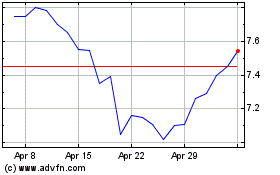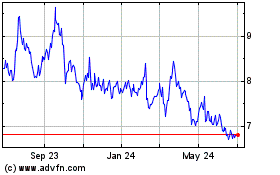China Car Sales Take Foot off the Gas
November 10 2016 - 4:00AM
Dow Jones News
SHANGHAI—China sold 20% more new cars in October than the year
before, the slowest pace of growth in four months as the rush by
consumers to tap a tax break on vehicle purchases appeared to be
leveling off.
Foreign and domestic car makers delivered 2.34 million passenger
cars—including sedans, crossovers and minivans—to dealers last
month, the government-backed China Association of Automobile
Manufacturers said Thursday, up from 1.94 million units in the
year-earlier period.
Sales in the world's largest car market have rebounded
significantly since October last year when China's central
government halved the 10% purchase tax on vehicles with 1.6-liter
engines or smaller. The tax cut was in response to four straight
months of slow sales. More than 70% of cars sold in China qualify
for the incentive, which helps consumers save up to 10,000 yuan
when buying a new vehicle.
The data illustrate the critical role government policy plays in
China's car sales. October's growth was strong, but marked a
significant slowdown compared with the previous three months, when
auto sales rose at least 26% each month, underlining industry
concerns that the tax break has largely pulled demand forward.
This could lead to flat growth next year. As U.S. auto sales are
tapering off and other emerging markets are shrinking, a severe
slowdown in China would add to a bleak outlook for the global auto
industry, say analysts.
So far this year, China's new-car sales are at 19 million
vehicles, a 15% increase from the same period a year earlier, when
sales grew less than 4% from the year before.
Robin Zhu, a senior analyst with research firm Sanford C.
Bernstein, said he expects China to continue to subsidize purchases
of small vehicles, albeit at a smaller scale. He thinks the Chinese
government will raise the purchase tax from 5% to 7.5% in 2017, he
said, still below the original 10%. China has said the current tax
break will expire by the end of December.
Fitch Ratings said it expects policy to remain supportive,
especially if there is a risk of a demand slowdown. "The automotive
industry is a pillar industry for the Chinese economy, and whose
performance is critical to economic stability. The government would
have multiple policy tools to boost car demand should there be a
weakening in auto sales," said Fitch in a recent note.
Most car makers have reported rosy results for October. General
Motors Co. said its China sales increased 5.7% year-over-year, Ford
Motor Co. posted a 14% gain, and Nissan Motor Co.'s rose 16%.
Chinese auto makers, whose consumers are more price sensitive,
gained more. Great Wall Motor Co., China's biggest maker of
crossovers, said its sales rose 20% year over year, and Geely
Automobile Holding Ltd., whose parent owns Volvo Cars, almost
doubled its sales from a year earlier.
As the year-end approaches, auto makers are quickening the pace
of shipping vehicles to dealers in an effort to improve their sales
revenue, causing an uptick in dealer inventories. According to the
China Automobile Dealers Association, an index created by the trade
group measuring inventories rose to the highest level since July in
October.
Overall, sales of all motor vehicles, including cars, vans,
buses and trucks, rose 19% from a year earlier to 2.65 million last
month. Year to date, China's motor vehicle sales gained 14% to 22
million units.
-- Rose Yu
(END) Dow Jones Newswires
November 10, 2016 03:45 ET (08:45 GMT)
Copyright (c) 2016 Dow Jones & Company, Inc.
Nissan Motor (PK) (USOTC:NSANY)
Historical Stock Chart
From Jun 2024 to Jul 2024

Nissan Motor (PK) (USOTC:NSANY)
Historical Stock Chart
From Jul 2023 to Jul 2024
